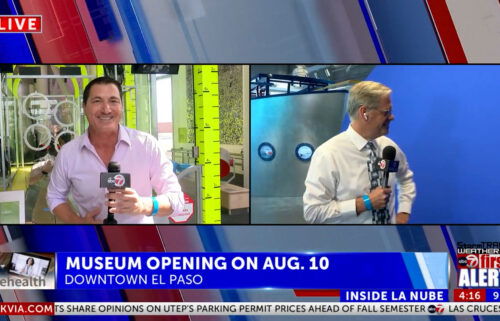Florida Supreme Court sides with DeSantis in felon voter rights case
Click here for updates on this story
Gainesville (Karina Elwood) — The Florida Supreme Court issued an opinion today agreeing with Gov. Ron DeSantis (R) that a state constitutional amendment allowing released felons to regain their voting rights was intended to include payment of court-ordered financial penalties, a potential barrier to hundreds of thousands seeking to register in advance of the 2020 election.
This opinion comes less than two weeks before oral arguments in a related federal case, and although it doesn’t have a binding effect on the case, it could influence how the federal appeals court interprets the amendment’s language.
Florida voters approved Amendment 4 in November 2018, which allows felons to register to vote after they complete their terms of sentence and parole. This amendment restored voting rights to about 1.4 million former felons taking effect January 2019. The amendment, however, does not restore voting rights for those convicted of murder or felony sex offenses.
DeSantis signed into law in June restrictions to Amendment 4 that felons must pay legal fines and fees before voting rights can be restored. Today, the Florida Supreme Court issued a nonbinding advisory opinion agreeing with DeSantis that felons must pay all fines and fees before their voting rights are restored.
DeSantis asked the Florida Supreme Court to advise whether “all terms of sentence,” which is in Article VI, Section 4 of the amendment, includes fees as well as time served and parole. The court said that when viewed in context, the phrase refers to all obligations, not solely “durational periods.” The court said all legal financial obligations must also be satisfied before voting rights can be restored.
Civil rights groups, including the American Civil Liberties Union of Florida, assert that the law amounts to a “poll tax” because it links voting rights and financial obligations. Poll taxes are unconstitutional under the 24th Amendment to the U.S. Constitution.
In response to the decision, DeSantis tweeted, “I am pleased that @FLCourts confirms that Amendment 4 requires fines, fees & restitution be paid to victims before their voting rights may be restored. Voting is a privilege that should not be taken lightly, and I am obligated to faithfully implement Amendment 4 as it is defined.”
The court’s advisory opinion does not legally affect the federal case. However, it could influence how the federal judges view the case during the upcoming oral arguments.
Danielle Lang, co-director of voting rights and redistricting at the Campaign Legal Center, which represents three of the plaintiffs in the federal case, released the following statement:
“The decision today by the Florida Supreme Court changes nothing in the ongoing federal lawsuit. We will continue to fight to ensure that people with felony convictions are not denied the right to vote based on their inability to pay. Disenfranchising people because of financial hardship violates the U.S. Constitution, and the Florida Supreme Court’s decision does nothing to change that. We look forward to making the case to Governor Ron DeSantis and Secretary of State Laurel Lee when we see them in court on Jan. 28.”
The court wrote in the advisory opinion that the issue with the amendment proponents’ argument “is that their preferred reading of Amendment 4 effectively renders superfluous the words ‘all terms of’ in the constitutional text.”
The U.S. District Court for the Northern District of Florida in Tallahassee ruled in Jones v. DeSantis in October that the state cannot prevent former felons from registering to vote because they cannot pay fines associated with their convictions.
The state appealed the case, which will be heard on Jan. 28 at the United States Court of Appeals for the Eleventh Circuit in Atlanta. Judge Robert L. Hinkle, who ruled in the district court, issued a preliminary injunction allowing the 17 plaintiffs to regain voting rights by proving that they are unable to pay the fees.
University of Florida political science professor and researcher Daniel Smith used court clerks’ data to show that more than 80 percent of those with felony records have outstanding fees. This means 1.1 million of the 1.4 million felons approved to register after Amendment 4 would be unable to vote because of the state law.
Because of backlash from Democrats and advocates, legislators added a section to the bill allowing courts to modify the original sentence. Several counties responded to this section by creating “rocket dockets,” which waive many felons’ fees at once, speeding up the process of restoring voting rights.
These counties—Miami-Dade, Broward, Palm Beach and Hillsborough—make up more than a third of Florida’s population and are largely Democrat, in a state that is well known for being a swing state. Majority Republican counties have not taken the same efforts. According to a Tampa Bay Times and Miami Herald analysis, 52 percent of felons who have lost their right to vote and are eligible for restoration were Democrats and 33 percent were not affiliated with a political party.
President Trump won Florida’s 29 electoral votes by 112,911 votes over Hillary Clinton in 2016. The implications of the bill passed by a majority-Republican legislature preventing former felons from voting could work to ensure Trump wins the 2020 presidential election.
Although the federal appeals court will soon hear arguments, that court’s ruling is subject to review by the U.S. Supreme Court, meaning there may not be a final resolution until after the 2020 election.
Karina Elwood contributed to this reporting.
Please note: This content carries a strict local market embargo. If you share the same market as the contributor of this article, you may not use it on any platform.
Gary Greenggreen@wuft.org3522941502




